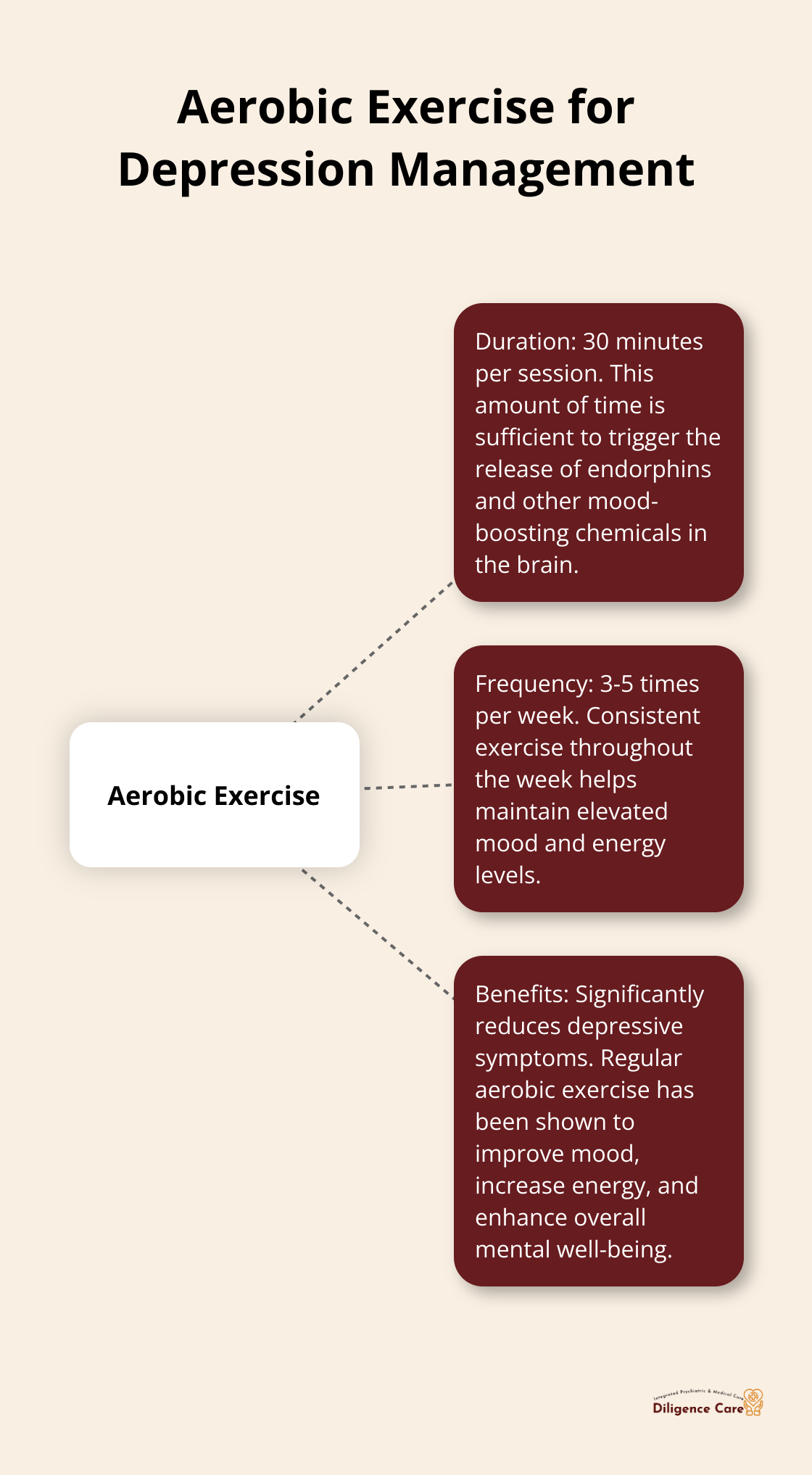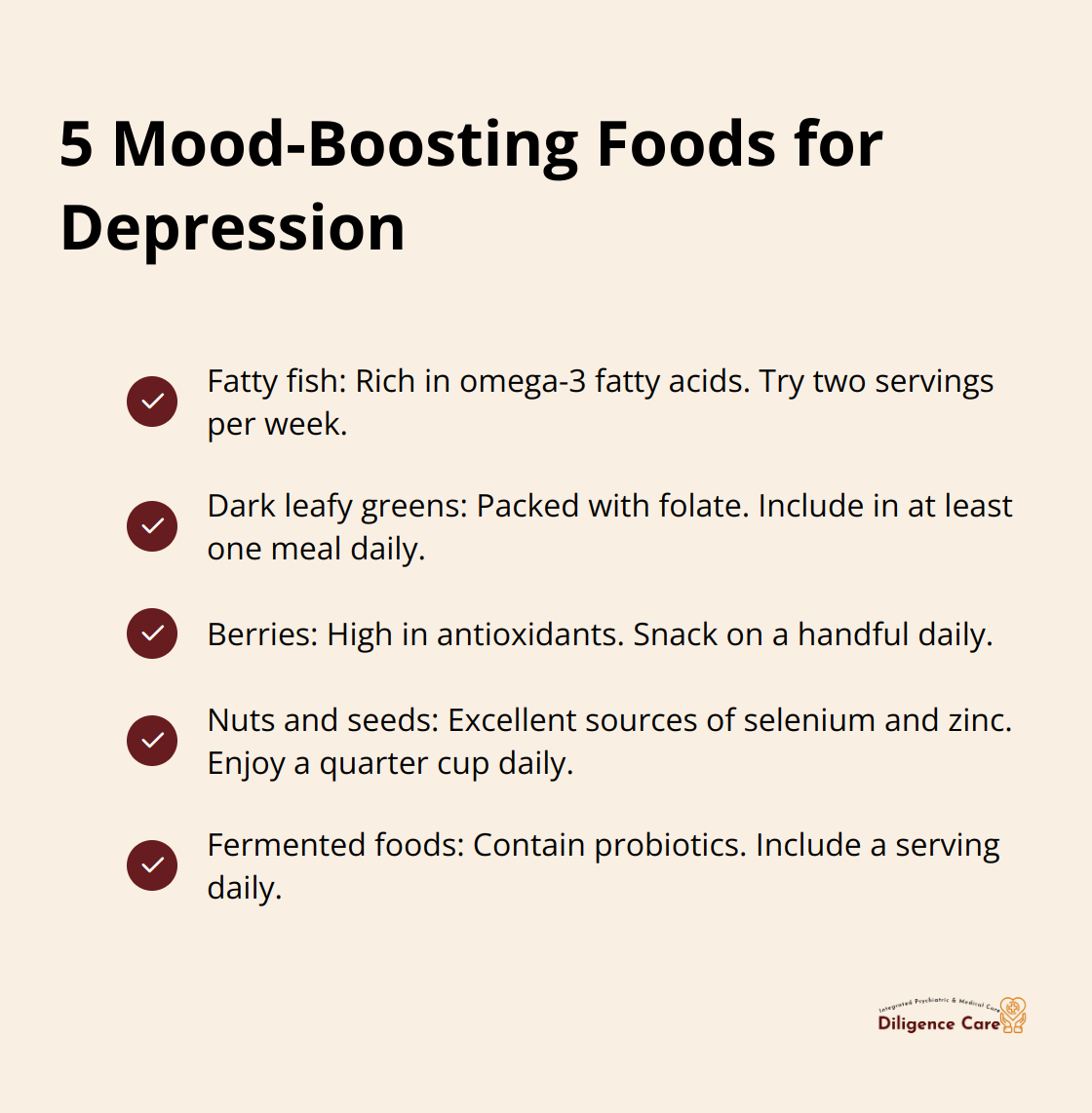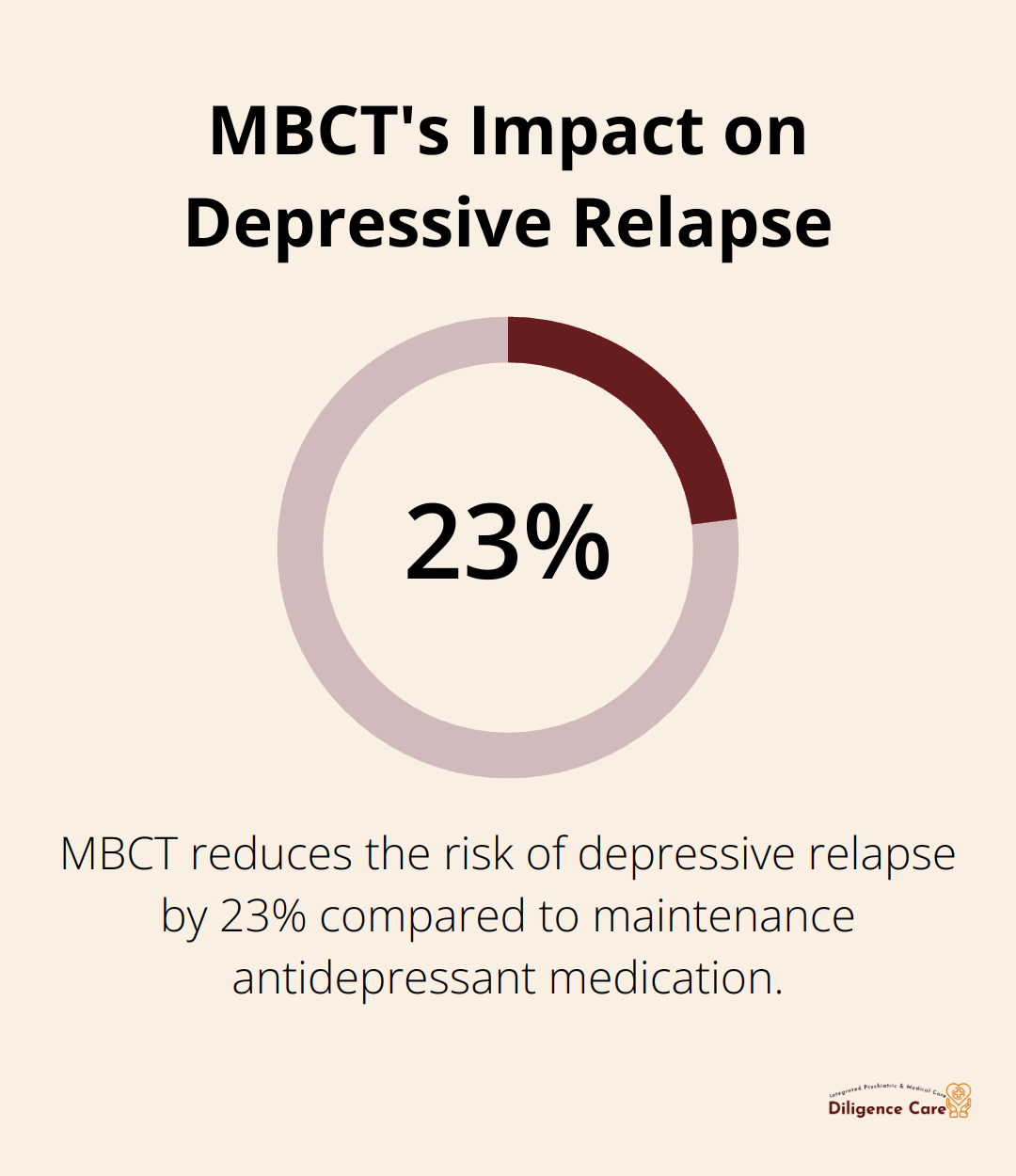
Natural Ways to Treat Depression Without Medication
Depression affects millions worldwide, but not everyone wants to rely on medication for treatment. At Diligence Integrated Care, we understand the desire for non-pharmaceutical depression treatment options.
This blog post explores natural ways to combat depression, including exercise, nutrition, and mindfulness techniques. These methods can be powerful tools in managing symptoms and improving overall mental well-being.
Exercise: Your Natural Antidepressant
Physical activity stands as a powerful tool in the fight against depression. Let’s explore why exercise proves so effective and how you can incorporate it into your daily routine.
The Science Behind Exercise and Mood
When you exercise, your body releases endorphins (often called “feel-good” hormones). These natural chemicals interact with receptors in your brain, reduce pain perception, and trigger positive feelings. A study published in the Journal of Clinical Psychiatry found that exercise can match the effectiveness of antidepressant medication for some individuals with major depressive disorder.
Effective Exercises for Depression
While any form of physical activity can benefit mental health, some exercises show particularly promising results for managing depression:
- Aerobic exercises: Activities like walking or jogging for 30 minutes a day, three to five times a week, can significantly reduce depressive symptoms.
- Strength training: Lifting weights or using resistance bands can boost mood and self-esteem.
- Yoga: Research suggests that practicing yoga can be effective in alleviating symptoms of depression.
- Group sports: Team activities combine the benefits of exercise with social interaction, which can prove particularly effective in combating depression.

Building a Sustainable Exercise Routine
Starting and maintaining an exercise routine can challenge anyone, especially those dealing with depression. Here are some practical tips to help you get started:
- Start small: Begin with just 5-10 minutes of activity a day. Increase the duration gradually as you build stamina and confidence.
- Choose enjoyable activities: You will more likely stick with exercises that you find fun or engaging.
- Schedule your workouts: Treat exercise as an important appointment in your calendar.
- Find an exercise buddy: A workout partner can provide motivation and accountability.
- Track your progress: Keep a log of your activities and how you feel afterward. This can help you stay motivated and see improvements over time.
Overcoming Exercise Barriers
Depression can make it difficult to find the motivation to exercise. Here are some strategies to overcome common barriers:
- Set realistic goals: Don’t push yourself too hard at first. Small, achievable goals can build confidence and momentum.
- Prepare in advance: Lay out your exercise clothes the night before or pack your gym bag in the morning.
- Use positive self-talk: Replace negative thoughts (“I’m too tired to exercise”) with positive ones (“I’ll feel better after I move my body”).
- Reward yourself: Plan a small reward for completing your workout, like a relaxing bath or your favorite healthy snack.
Exercise serves as a powerful tool in managing depression, but it’s just one piece of the puzzle. In the next section, we’ll explore how nutrition plays a vital role in supporting mental health and combating depression.
Food for Thought: Your Diet’s Impact on Depression
The Brain-Gut Connection
Your gut and brain communicate constantly. This connection, known as the gut-brain axis, influences your mood and mental state. A study found that diet plays a role in the prevention and treatment of depression, with potential underlying mechanisms being reviewed.
Dr. Bolanle Oluwadara, MD, at Diligence Integrated Care, emphasizes the importance of a balanced diet to her patients. “What you eat directly affects how you feel,” she states. “A healthy gut leads to a healthier mind.”
Mood-Boosting Foods
Certain foods contain nutrients that support brain health and may alleviate depression symptoms. Here’s what to add to your shopping list:

Dietary Changes for Better Mental Health
Implementing dietary changes can challenge anyone, especially those dealing with depression. Bernadette Akpengbe, PMHNP-BC, FNP-BC, at Diligence Integrated Care, suggests starting small. “Replace one processed food item with a whole food alternative each week,” she advises. “Over time, these small changes add up to significant improvements in diet and mood.”
Here are some practical tips to get started:
- Plan your meals: Prepare a weekly meal plan focusing on whole foods. This reduces the temptation to reach for processed, mood-dampening foods.
- Stay hydrated: Dehydration can worsen depression symptoms. Try at least 8 glasses of water daily.
- Limit caffeine and alcohol: Both can disrupt sleep patterns and exacerbate depression. If you drink coffee, stop by early afternoon.
- Eat regularly: Skipping meals can lead to mood swings. Try three balanced meals and two healthy snacks daily.
- Cook at home: This gives you control over ingredients and portion sizes. Start with simple recipes and gradually expand your culinary skills.
Dietary changes should complement, not replace, professional treatment. Diligence Integrated Care offers comprehensive mental health support, including nutrition counseling as part of our integrated approach to depression management.
The next section will explore how mindfulness and meditation techniques can enhance your mental well-being and complement these dietary strategies. These practices, when combined with a healthy diet, create a powerful toolkit for managing depression naturally.
Mindfulness Meditation for Depression
Understanding Mindfulness and Its Impact
Mindfulness meditation provides a powerful tool for managing depression. This practice involves focusing on the present moment without judgment, which can break the cycle of negative thoughts often associated with depression.
Research demonstrates that mindfulness meditation can significantly reduce symptoms of depression. A study published in JAMA Psychiatry found that MBCT can significantly reduce the risk of depressive relapse by 23% compared with maintenance antidepressant medication. This practice changes the way we relate to our thoughts and emotions, rather than trying to eliminate them.

Simple Meditation Practices to Start With
Starting a mindfulness practice doesn’t require hours of silent meditation. Here are some simple techniques you can try:
- Body Scan: Lie down and focus your attention on different parts of your body, from your toes to your head. Notice any sensations without trying to change them.
- Mindful Breathing: Sit comfortably and focus on your breath. When your mind wanders, gently bring your attention back to your breathing.
- Loving-Kindness Meditation: Direct positive thoughts and wishes towards yourself and others. This can help combat feelings of worthlessness often associated with depression.
Try starting with just 5 minutes a day. Consistency matters more than duration when beginning a mindfulness practice.
Incorporating Mindfulness into Daily Life
Mindfulness isn’t limited to formal meditation sessions. You can practice mindfulness throughout your day:
- Mindful Eating: Pay attention to the taste, texture, and smell of your food. This can help you enjoy your meals more and improve your relationship with food.
- Mindful Walking: Focus on the sensation of your feet touching the ground as you walk. This can turn a simple stroll into a meditative practice.
- Mindful Listening: When talking with others, give them your full attention. This can improve your relationships and reduce feelings of isolation.
- Mindful Technology Use: Take regular breaks from screens and practice being present in your environment.
Patience plays a key role when developing a mindfulness practice. It’s normal for your mind to wander. The key is to gently redirect your attention without self-criticism.
Mindfulness-Based Therapy
For those in San Bernardino, Riverside, and Southern California, mindfulness-based therapy can form part of a comprehensive approach to depression treatment. A trained professional can help you develop a mindfulness practice tailored to your needs and lifestyle.
Mindfulness can be a powerful tool in managing depression (especially when combined with other treatments). Always consult with a mental health professional before making changes to your treatment plan.
Final Thoughts
Depression treatment involves various non-pharmaceutical options. Exercise acts as a natural antidepressant, nutrition supports brain function, and mindfulness meditation helps manage symptoms. These approaches can work effectively, but individual needs differ, and professional guidance proves invaluable in creating a comprehensive treatment plan.
We at Diligence Integrated Care understand the importance of a holistic approach to mental health. Our team of experienced professionals provides personalized care that integrates various treatment modalities. We encourage you to explore these natural methods under the guidance of our mental health experts.
Seeking help shows strength, not weakness. If you struggle with depression, reach out to us. We offer support on your journey to better mental health, with services tailored to your unique needs (including non-pharmaceutical depression treatments).











